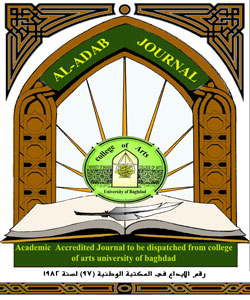Abstract
The present paper offers a comparative feminist reading of the American novelist Edith Wharton and the Egyptian novelist Taha Husain. It aims at analyzing both Wharton’s Bunner Sisters (1916) and Husain’s The Call of The Curlew (1934/1980) in terms of feminist criticism demonstrated in Beauvoir’s theory of patriarchy in her book: The Second Sex (2010). The analysis of these novellas provokes three substantial points regarding the artistic achievement of both writers. First, patriarchy is a male programming intended to subdue and decentralize the female by treating them as a sexed being, or rather as an inessential other. Second, the inferior position of women inspires Wharton and Husain to incorporate Beauvoir’s theory of patriarchy into their fictional works. To attain such an aim, both writers start narrative visions through which they expose patriarchal methods to marginalize and subordinate women. Lastly, the close reading of the novellas shows that they reflect the systemized oppression of women. Such is the shared leitmotif of Wharton and Husain’s narrative.
Keywords
Hegemony.
sisters; curlew
Wharton; Husain; patriarchy; segregation
Abstract
تستعرض الورقة البحثية الراهنة قراءة نسوية مقارنة للكاتبة الأمريكية اديث وارتن وعميد الادب العربي طه حسين حيث تقدم الدراسة تحليلاً لكل من رواية وارتن الاخوات بنر (1916) ورواية طه حسين دعاء الكروان (1934) وفقاً لنظرية سيمون دي بوفوار النسوية وكما جاءت في كتابها الموسوم الجنس الاخر (2010) ويبين تحليل الروايتين ثلاث نقاط مهمة تخص الانجاز الادبي الفني لكلا الكاتبين. اولهما ان السلطة الذكورية ماهي الا نظام أنشأه الرجل لتشتيت المرأة واخضاعها لرغباته الحسية باعتبارها كائن حسي او كيان "اخر" مهمش وتعد النظرة الدونية للمرأة هو الامر الثاني الذي دفع كل من اديث وارتن وطه حسين لأعتماد نظرية بوفوار النسوية في اعمالهم السردية من خلال صور سردية تقتنص الوسائل التي يتبعها المجتمع الذكوري لتهميش المرأة واغضاعها لرغباته واخيراً فأن القراءة المعمقة لروايات الكاتبين تستعرض القمع الذي تعانيه المرأة في المجتمع الغربي والعربي على حد سواء.
Keywords
وارتن، حسين، السلطة الذكورية، التفرقة، الاخوات، الكروان، الهيمنة.
